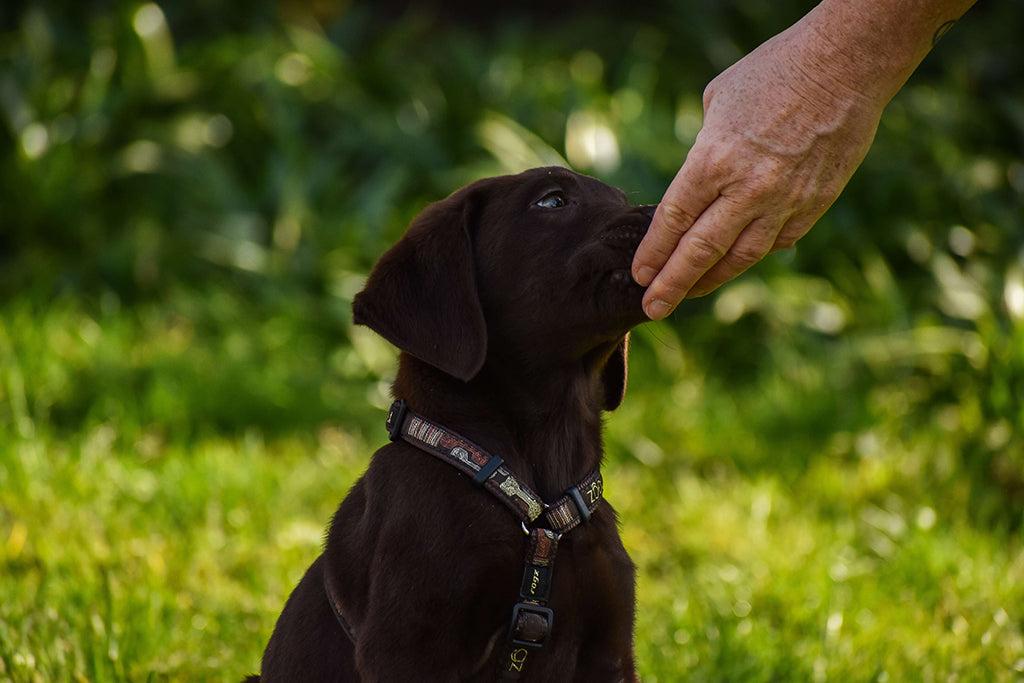In this blog, we learn all about whether dogs can eat nuts! We’ll discover if it’s safe for a dog to eat nuts, and if they can, which ones in particular and whether nuts are good for dogs.
Can Dogs Eat Nuts?

Are Nuts Good For Dogs?
If you’re wondering “are nuts safe for dogs?“, nuts contain Omega 3 fatty acids, which we know can be great for dog’s joints, their skin, and coat health. However, nuts are very high in calories and fat so should only be considered as a very occasional treat food. Too much fat in a dog’s diet can cause an upset stomach, leading to issues like diarrhea and being sick. Over a longer period of time, a high-fat diet can lead to inflammation of the pancreas called pancreatitis.
As a general rule, treats shouldn’t make up more than 10% of a dog’s daily food intake to help keep their weight (and thus health) under control. Read up on how many treats you should feed your dog here.

What Kind Of Nuts Can A Dog Eat?
Nuts that are relatively safe for a dog to eat in small quantities include:
- Unshelled pistachios
- Cashews
- Dry-roasted, unsalted peanuts
- Pine nuts
- Almonds & Hazelnuts: These two are OK, but Almonds can be hard to chew and can also be quite large. So, they do pose a choking and digestive blocking risk. In the case of hazelnuts, these are a unique shape and may pose a choking hazard, particularly for smaller breeds. Feed these three nut types to your dog with more caution.
Can Dogs Eat Peanut Butter?
Yes, dogs can eat peanut butter but be sure to opt for a brand that is low in sugar and salt. But, most importantly, make sure the peanut butter doesn’t contain xylitol (artificial sweetener). Xylitol is incredibly toxic to dogs.
Is It OK For A Dog To Eat Seeds?
There are some seeds that dogs can eat. For example, Flax, Chia, and Sunflower seeds are OK for dogs to eat, but make sure you only let your dog have a small amount per day as these too can be high in fat. Aim for no more than ¼ of a teaspoon of seeds per day.
Can Dogs Eat Honey Nut Cheerios?
Yes, it’s safe for dogs to eat a little of your Honey Nut Cheerios, but as with nuts, only as a treat as the nutritional value of honey nut cheerios to a dog is essentially nil.
What Nuts Can Dogs Not Eat?
There are some nuts that dogs shouldn’t eat. These include:
- Macadamia Nuts – Macadamias are extremely toxic to dogs
- Brazil Nuts – The fat content is too high, and can cause unwanted digestive stress
- Pecans & Walnuts – these two nut types contain a compound called juglone which is harmful to dogs
- Nutshells – Nutshells can be sharp, so pose a threat to their digestive system and are generally more difficult for dogs to digest
- Out Of Date Nuts – Moldy nuts can be very dangerous for a dog to consume. Ingesting mold can cause problems with their liver and in some cases even induce seizures
- Flavored Nuts – Things like chilli nuts, or honey-roasted nuts can potentially be poisonous to your dog so it’s best to avoid these specially-tampered-with nuts.
Check out our list of other human foods that are known to be toxic for dogs and should be avoided at all costs:

What Are The Signs I Need To Call A Vet?
If you think your dog has consumed a macadamia nut, a nutshell, moldy/flavored nuts, call your vet immediately.
If your dog appears lethargic, vomits, has diarrhea, has a seizure, or seems unlike themselves/unwell after eating nuts, call your vet with haste.
Most dogs don’t have an issue with a couple of “safe” nuts and seeds here and there. Just be mindful of their daily fat and calorie content alongside their consumption of tasty, small but densely fatty nuts.
Also read: Should You Keep Dogs Away From Acorns?
Sources
Author Ovechkin, Danil “Can Dogs Eat Nuts” Dog Eared, My Ollie, May 07. 2019 https://blog.myollie.com/can-dogs-eat-nuts/#:~:text=Generally%20speaking,%20nuts%20are%20safe,which%20is%20fine%20in%20moderation.
Author Lowrey, Sassafras CTDI “Can Dogs Eat Pecans?” American Kennel Club, Nov 01. 2022 https://www.akc.org/expert-advice/nutrition/can-dogs-eat-pecans/
Author Bittel, Marybeth “Is It Okay For My Dog To Eat Seeds?” Animal Wellness Magazine, Feb 27. 2018 https://animalwellnessmagazine.com/dogs-seeds/
 S
S



